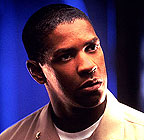|
|
|
|
Crimson
Tide
|
 |
|
As a war film for the '90s, Crimson Tide pulls off an unusual balancing act. The plot imagines a new conflict between America and "rebel troops" in Russia, in order to stir the spectre of the Cold War. We are frequently told by the characters that it is the Cuban Missile Crisis all over again – only this time, the likely pay-off is a nuclear Holocaust. Accordingly, both the narrative and the general mood of Crimson Tide are closely modelled on those great Cold War films made in the aftermath of the Bay of Pigs incident – steely dramas such as Fail-Safe (1964) and The Bedford Incident (1965), rather than the jet black comedy of Stanley Kubrick's Dr. Strangelove (1964). In all these movies, as in David Cronenberg's The Dead Zone (1983), it all boils down to one, terrifying question: whose finger will be on the button that can trigger the end of the world? You may well wonder what kind of gruesome, reactionary nostalgia this is. Yet it does not spoil the plot of this thrilling movie to suggest that, if it rakes over the nightmare of the Cold War, it does so in order finally to reassure us that the New World Order is indeed a better time and place in which to live. The melodramatic oppositions of the piece are simple but highly effective. Ramsey (Gene Hackman) is an old-fashioned soldier who is stoic, seething authoritarian, fond only of his dog and choice quotations from Clausewitz. Hunter (Denzel Washington), on the other hand, is a new breed: educated, progressive, able to lucidly paraphrase Paul Virilio's critique of "pure war". It is Hunter's rationality which, in the scheme of the film, gives hope for the globe's survival. With the appalling gung-ho success of Top Gun (1986) under his belt, director Tony Scott brings a surprisingly level head to this project. A few Gothic views of an enemy submarine aside, Scott plays down the paranoia factor, and even the militarist glee whenever the Good Guys score a king hit. Gone, too, is the pronounced homoeroticism associated with the violence in Top Gun. On the stylistic plane, Scott has mercifully tempered his usual tendency towards overwrought, MTV-type pyrotechnics. One can forgive his occasional askew angles and pendulum-like camera moves, since his basic grip on this story is so solid and true. The only reminder of his encounter with Quentin Tarantino's script for True Romance (1993) is the strange string of pop references reportedly plugged in by QT himself – to old war movies, Silver Surfer comics and (most hilariously) Star Trek. MORE Scott: Domino, The Fan, Man on Fire © Adrian Martin July 1995 |
![]()